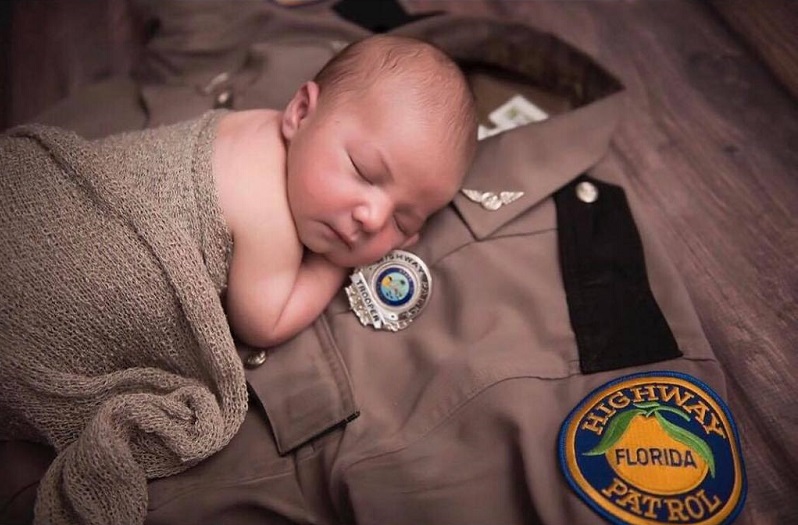

As far back as I can remember (about age five-ish), I felt that prideful pull to be a police officer. Every cop show or sighting of a NYPD squad car primed and cemented my notion of one day being among them.
Although I am unaware of any of my ancestry ever pinning a police badge, I always knew I’d strive until I made the grade and wore police blue. Even though there is no police gene, mountains of anecdotal evidence conveys tons of conviction to be a cop, many overcoming seemingly insurmountable obstacles/odds to suit enormously stringent requirements permitting that rite of passage.
Through the years I have read or had chance meetings with folks who professed similar early constructs of one day becoming a cop; conversely, I know a few who never had an inkling to be a law enforcement officer yet eventually did exactly that. Some of my childhood friends went on to become NYPD cops, even though they took the New York City police examination on a fluke —“just looking for a civil service gig” —and turned out to be fantastic cops, as if they were born for the role.
So, we have variations about the question, Are some born to be police officers?
Throughout my police career, the majority of rookies cited early onset of this thing called “police work.” The “desire to help people” was/is a standard answer as to why, with scant few deviating from that universal assertion, citing instead that the “benefits” or “retirement package” was the lure to law enforcement. Salary was not really a major magnet; as is often reiterated, there’s no monetary wealth to be had in the police biz (and that denotes how very special career cops are, doing life-threatening work for nonmonetary rewards). It is no wonder cops work their “off days” by providing security at special events and such, garnering extra pay to make ends meet.
Some get into policing because one or more members of their family are/were on the force—proverbially following in dad’s or a brother’s shoes. Even with that lineage replicating cop careers, where did it all start, and why? Did it stem from a great grandfather who may have been born to be a cop, and generations followed?
I believe it is a lot like being a physician or an attorney, where some seed is present from the get-go (relative to developing cognition and thus influence from at least one source) and honed until fruition.
My earliest recollection influencing my mindset to be a policeman stemmed from growing up in NYC, always seeing cops and hearing sirens chronically wailing, racing from call to call. These were the “good guys” I was told were purposed to handle matters others would not. Despite that ominous messaging, it clicked. I was sold and maintained a steady diet of cop shows and police movies and newspaper reports about criminal capers and the cops who investigated and apprehended the bad guys and saved victims from further depravity.
As we wrestle with an upended planet thoroughly shaken by COVID, unsettling everyone and pretty much everything in one way or another, cops’ jobs have become unprecedentedly difficult. Pro-police supporters are materializing and coming out in favor of those who pin badges, wrap a duty belt, and hit the mean streets to stand for those who cannot stand for themselves. And kids are watching.
A recent article we published highlighted a young boy named Trey Elliott whose mission it is to pray over every police officer imaginable. Here’s a kid whose servant’s heart is already formed, reaching far and wide, extending support for all cops…and he is already primed to be a SWAT officer when his chronological age matures accordingly. How many Treys are out there? Anecdotally, I suspect there are many.
Despite the growing reports that folks are not applying for police roles as much as in years past (likely dissuaded by the hateful anti-police propaganda) and career cops are departing in droves (mostly due to the same anti-police drum-bangers and anemic executives bound by political bondage), police academies across the country are filling seats and graduating police cadets.
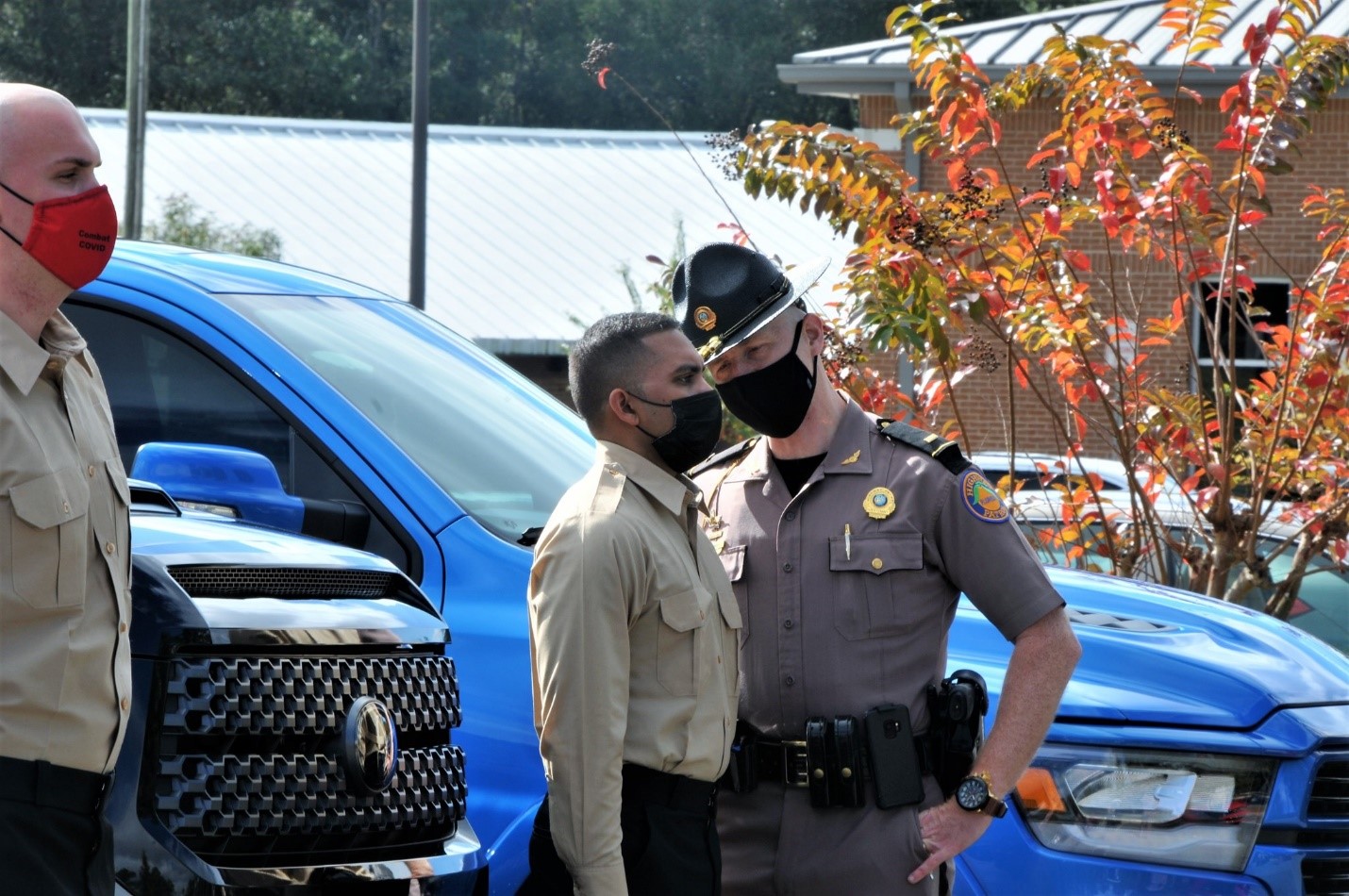
(First day for state police cadets at the academy. Photo courtesy of the Florida Highway Patrol Training Academy.)
Perhaps it is the way I think, but I see a litany of children impacted by cancer and other life-threatening illnesses who, despite such life-threatening circumstances, nevertheless aspire to be a police officer (staring down the odds against). That is the conviction we mentioned above, cocooned until the timing is right. Their hope is two-fold: battle cancer successfully and someday pin a justice shield, both of which are hard-earned badges of honor. There are ample organizations of cops who sort of serve as wish granters, fulfilling the desires of youngsters fighting cancer while maintaining a steady gaze on the notion of being a police officer. Many cop shops across the nation swear-in these children as “honorary police officers,” in effect providing a taste of police culture from the role models they admire.
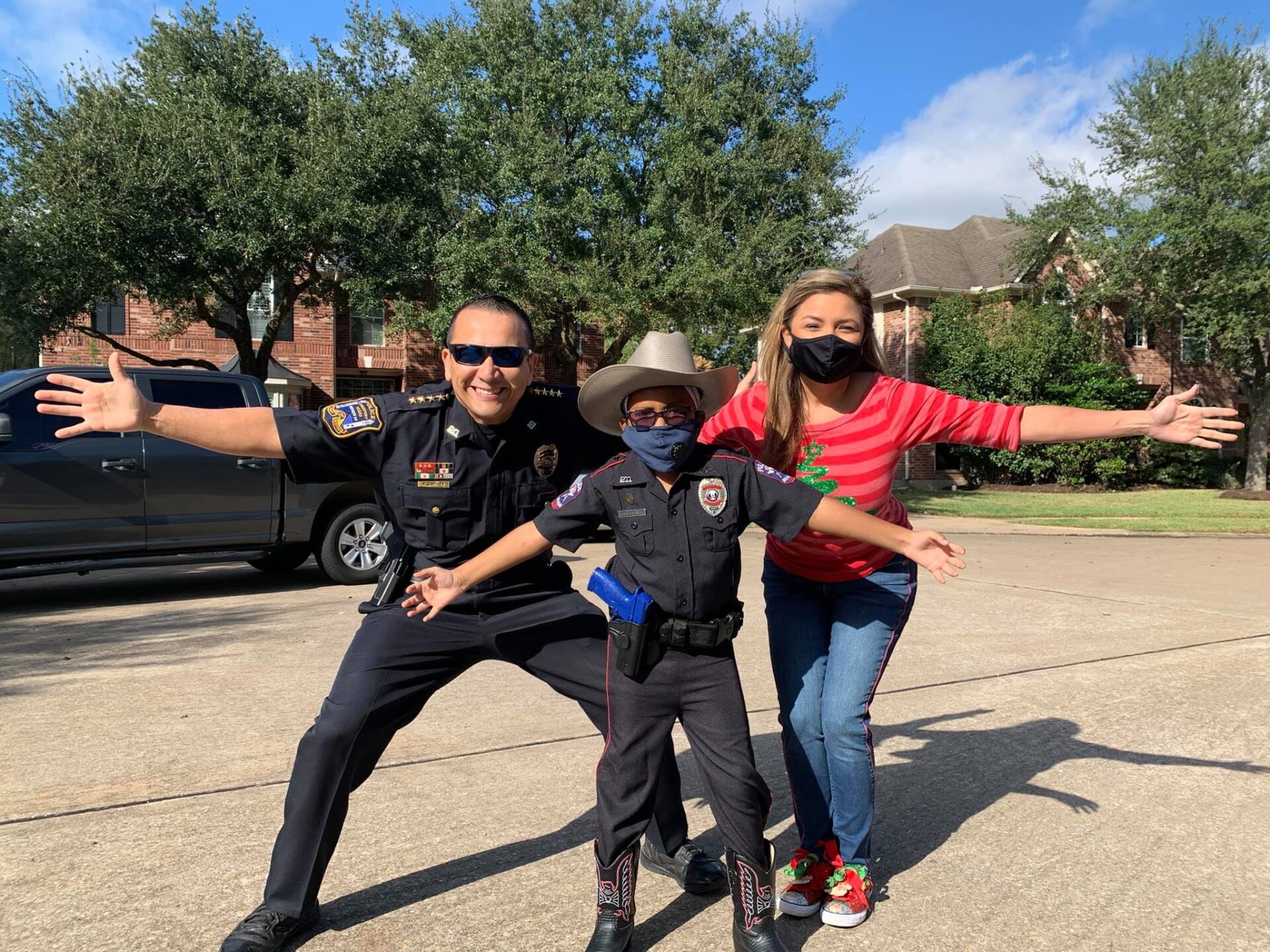
(Freeport, Texas police Chief Ray Garivey and his wife flank a youngster whose dream is to someday be a police officer. Freeport PD made this youngster an honorary police officer. Photo courtesy of Chief Ray Garivey.)
There are police organizations [501 (c) (3)s] expressly formulated to aid embattled children. Cops for Kids with Cancer exists to do exactly what their namesake says, helping sick youngsters while also fostering their police dreams.
Tons of kids across the nation were recently exposed (some not for the first time) to law enforcement officers and the equipment they use on duty. The annual Great American Teach-In transpired a few weeks ago.
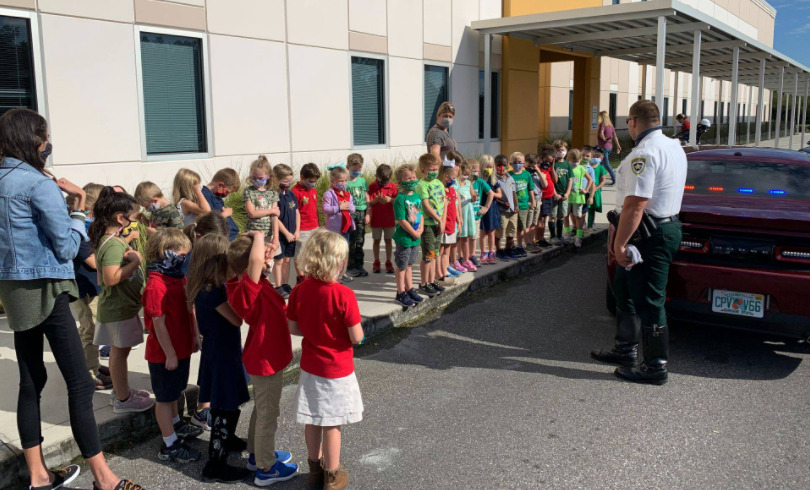
(Deputy teaching youngsters at the Great American Teach-In in November 2020. Photo courtesy of the Hillsborough County Sheriff’s Office.)
How many of those kids felt the flame within them, illuminating visions of one day being in duty boots and mentoring youngsters, saving lives, and ensuring peace for countless others? How many of those same kids already harbored notions of pinning a badge one day?
In my duty days, I always pledged to participate in the Teach-In at area schools. Invariably, a decent number of the youthful flock would come up to me after the “class” and utter those dreamy words: “I wanna be a police someday” (often through smiles depicting spaces where baby teeth made way.)
Social media channels are ripe with imagery of kids adoringly chillin’ with cops who they see out in public or wherever the chance meetings are perhaps predestined. Well, to a large extent thanks to COVID, physical interactions have been severely minimized due to public health factors. Thus police heroes of which kids are so fond innovatively retooled meetings, many having “drive-by birthday” celebrations complimented with a phalanx of cop cars. That’s how cops are, always going above and beyond after out-of-the-box thinking plans are formed and launched, in the same solidarity kids observe and admire from early days.
In context, Norfolk, Massachusetts School Resource Officer Michelle Palladini spelled out the spectral formative years of kids and how LEOs serve as a beacon illuminating young ones searching for direction and role modeling, some of whom may be nesting a future police officer egg:
Notice, in one classroom setting, she was speaking to a class of sixth-grade students, all of whom were seemingly fixated on her speech (and likely the police uniform and its intriguing adornments). Liken that to even younger children seeing cops out on the beat having chance interactions, and one can conjure lightbulb moments for youngsters to entertain life as a cop, enamored by such an embodiment of goodness, forming the moral mindset of being in such a position for others’ benefit.
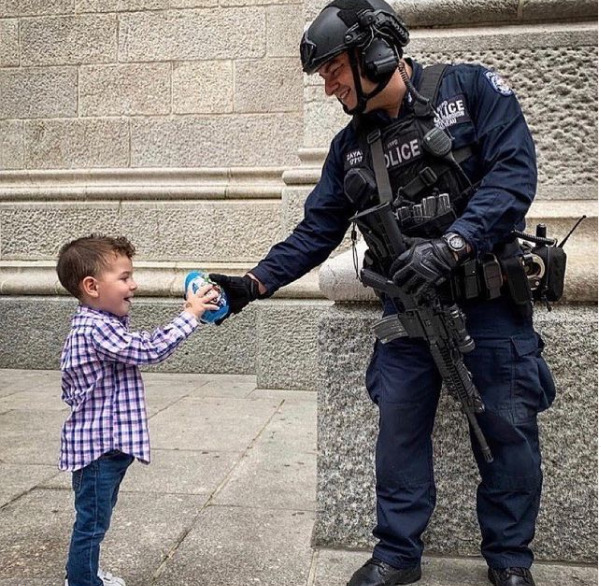
(Photo courtesy of the New York City Police Department.)
As one student’s parent emphatically stated, “[Officer] Michelle was a gift…to all the kids!” Fascinating testimony with exponential dividends, maybe some even materializing in future LEOs. And to think some naysayers want to sanitize schools of resource officers based on uneducated, immaterial notions, and political joysticks.
“All they want to do is be heard, and being in that position is so rewarding,” said Officer Palladini. Imagine those words forming in the hearts and minds of kids, punctuated by the ideal of paying it forward…some day. This parallels the traditional philosophy of that one fantastic teacher who made such an impact on a child who ultimately blossoms and does good things down the road.
Perhaps it is no coincidence that Michelle became a police officer. As we heard in the video above, her dad was a state policeman who told her when she was young, “Oh, you know, I was out helping people today.” Who wouldn’t want to be in those shoes?
In Officer Palladini’s words, “We have this ability to kind of shape who they become.” Whether we are born to be cops or not, at least we have iconic role models readily exemplifying what it is like to be a cop, perhaps sparking the beginnings of future peacekeepers with badges.
Simply analyze any photo of a child sitting in the driver seat of a police cruiser, and you will undoubtedly see a facial/bodily expression ripe with utter glee, assured safety, and sparks warming the “one day” dreams we all harvest and nourish until fruition—the proverbial rite of passage.
In a deep way, cops are in the business of keeping hopes alive and well. In association with that realm, kids who are inspired by cops and eventually mature to become one are then fashioned with the metaphorical currency to pay it forward…like cops do in traditional and/or unique ways. The cycle exists. The ecosystem of police culture fortifies humanitarian constructs encompassing all ages, with an extra seasoning applied to our youngest beings for whom we have a responsibility to guard and guide.
To a large extent, I think we are born for certain things while also exploring/growing other possibilities. The adage of wearing many hats applies, yet we each have a certain special cap we don with organic heartfelt predisposition.
Although the answer to the question may seem elusive and purely anecdotal, one thing for certain is that there are myriad examples out there, depicting cops from all over setting wonderful examples for kids to follow…and that is a tangible substantiation of birthing and harvesting future cops: Heroes influencing heroes.